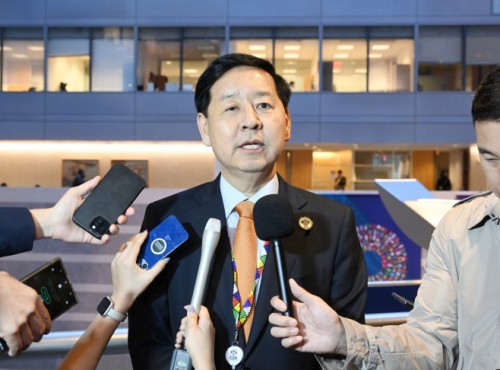 |
| South Korean Deputy Prime Minister and Finance Minister Koo Yoon-cheol speaks during an interview with Seoul correspondents at the International Monetary Fund headquarters in Washington, D.C., on Oct. 16. / Source: Ministry of Economy and Finance |
South Korean Deputy Prime Minister and Finance Minister Koo Yoon-cheol suggested Thursday that the United States could retract its demand for a $350 billion upfront investment, saying Washington now better understands Seoul’s foreign exchange stability concerns.
Speaking with reporters at the International Monetary Fund headquarters in Washington on Oct. 16, Koo said he had met U.S. Treasury Secretary Scott Bessent during the G20 finance ministers’ meeting. “When the U.S. side asked Korea to pay $350 billion upfront, Secretary Bessent understood that it would be difficult for us to accept,” Koo said. “He appears to have discussed the matter internally with Commerce Secretary Howard Rutnick, who is leading the trade negotiations.”
Koo is in Washington to attend the G20 Finance Ministers and Central Bank Governors Meeting and the IMF–World Bank Annual Meetings.
“Bessent recognizes that maintaining stability in Korea’s foreign exchange market benefits both Korea and the United States,” Koo said. “I believe he is genuinely interested in supporting and cooperating with us to that end.”
Asked whether this meant the U.S. was likely to drop its upfront demand, Koo replied, “They understand our position, so in that respect it could be favorable to us.” When pressed further on whether this reflected meaningful progress, he confirmed, “That’s how I see it.”
Koo emphasized that his main negotiation channel is now with Bessent. “I haven’t met Rutnick since late July. I’ve asked Secretary Bessent to relay Korea’s position internally, and his level of understanding has definitely improved — it’s a good sign,” he said.
Regarding the Korea–U.S. currency swap, Koo said it was one of several tools available to safeguard financial stability. “A currency swap is one of many options — ‘one of them’ — to ensure stability in our FX market depending on how the trade negotiations unfold,” he said. “It’s not about whether it’s absolutely necessary or not right now, or how large it should be.”
However, Koo also acknowledged uncertainty about whether President Donald Trump could ultimately be persuaded to change course. “As far as I know, the U.S. side wants the $350 billion upfront payment to happen quickly,” he said. “It’s unclear whether President Trump can be convinced otherwise.”
Most Read
-
1
-
2
-
3
-
4
-
5
-
6
-
7





















